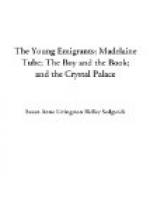* * * * *
Sunday, in the family of the emigrants, was generally happy; even the very youngest seemed to be influenced by the spirit of peace that breathed around on that holy day. No loud boisterous voice, no jeering laugh was ever heard; a subdued, composed, yet cheerful manner, marked the enjoyment of rest from the fatigues of the past well-spent six days of labor, while the earnest remembrance of their Maker, the eager desire and striving to learn and to do their duty to Him and to each other, made the commencement of each new week as profitable as it was welcome. The recollection, too, of the land they had left was more tender on this quiet day, and past joys and trials were often recalled with a kind of melancholy pleasure, sometimes with an almost regretful feeling that the scenes in which they had laughed and toiled should know them no longer. The green fields—the hawthorn hedges—the cottages and the little gardens, gay with the rose and the hollyhock—the ivy-grown village church—all were remembered and talked of in love—seeming ever more beautiful as memory dwelt on them. They acknowledged with thankfulness the blessings of their present lot—they looked forward hopefully to the future—but, oh! how deeply they felt that the far-off island, the land of their birth, could never be forgotten!
Here in the woods, where no church was near, when the never-omitted morning prayer was ended, Mr. Lee read aloud some good plain discourse, and explained those passages the children had not perfectly understood; the evening was spent in listening to interesting portions of the sacred history, and in instructive and pleasant conversation. Before retiring to rest, all voices joined in some sweet hymn of praise, and then, with hearts softened by the touching sounds, and purified by the blessed influences of a day so passed, they slept the calm, untroubled sleep of innocence, to awaken on the morrow strengthened and refreshed, to obey once more the Divine command—“Six days shalt thou labor.”
CHAPTER V.
STRIVING AND THRIVING.
Ten years after the settlement and incidents related in the preceding chapters, it would have been difficult to recognise the log-cabin in the substantial farm-house that occupied its place. The forest which once so nearly enclosed it was gone, or only to be traced here and there in a few decaying stumps, or the gray ruins of girdled trees which yet resisted wind and weather. The meadow land was covered with grazing sheep and cattle, the yard filled with stacks of hay and fodder, and large convenient barns and stables stood where the little out-houses, which once sufficed to accommodate all the emigrants’ gear, had formerly been; corn fields, and orchards of peaches and apples surrounded the dwelling, which, with its flowergrown piazza and gay garden, presented a pretty picture of peace and plenty.




